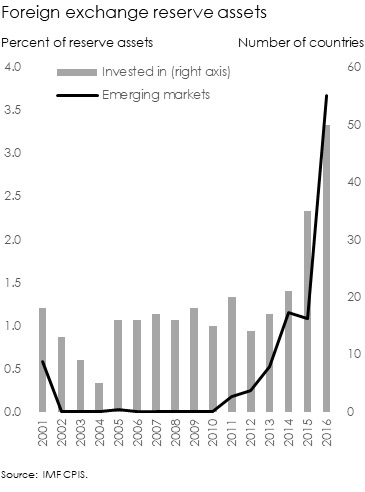International reserve diversification
6 December 2017
The composition of central banks’ international reserves has not changed much over the decades. Or has it? The latest IMF Coordinated Portfolio Investment Survey (CPIS) shows a significant increase in the number of countries in which assets are invested that are held as foreign exchange reserves.1 This seems indicative of some momentum towards greater diversification in international reserve holdings.
The data confirm a significant upward trend in investments by country of foreign exchange reserves. From an average of 17 countries in 2005-14, investments increased to 35 countries in 2015 and 50 countries in 2016 (Chart). The share of emerging markets increased to 3.7 percent from an average of 0.3 percent in 2005-14 of which China represents 1.1 percentage point.

The 2016 inclusion of the renminbi in the IMF SDR currency basket acknowledged that the international monetary system had changed too little in particular in light of the recent development of the global economy. The persistent high concentration in a small number of key currencies, notably the dollar and euro constitute an undue dependence on a narrow range of central banks and thereby large exposure to idiosyncratic risks. If the latest CPIS data affirm a shift in the propensity to hold reserve assets in a broader range of currencies, this could indicate some incipient change towards a more diversified international monetary system.
1 IMF CPIS released 4 December 2017.The data are based on Table 9 that include data from the Survey of Securities Held as Foreign Exchange Reserve (SEFER) and forms part of the IMF Balance of Payments Statistics pertaining to reserve assets. 7 percent of the reported holdings in 2016 are held by international organisations. The data offer a different perspective than the IMF Survey of Currency Composition of Foreign Exchange Reserves (COFER). Investments in a country must not be denominated in the currency of that country, e.g. Eurobonds.